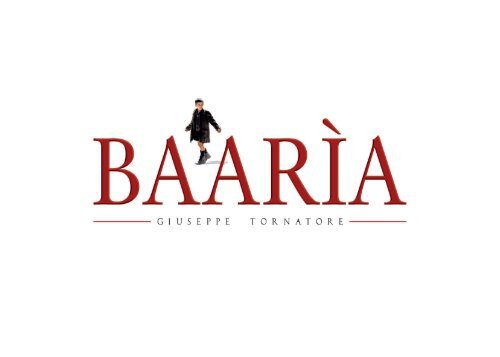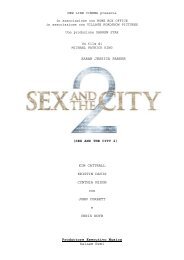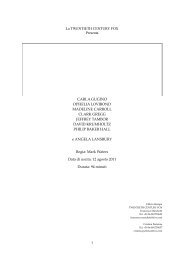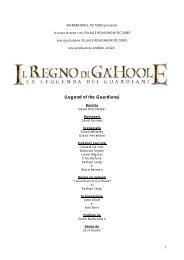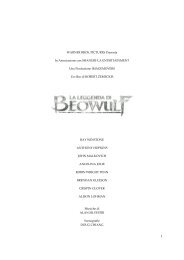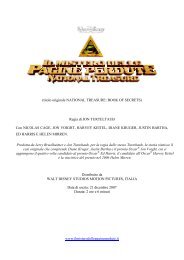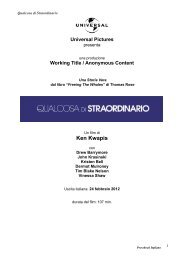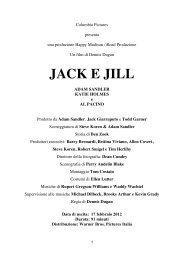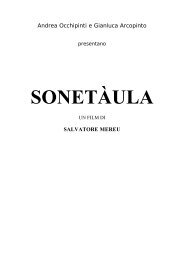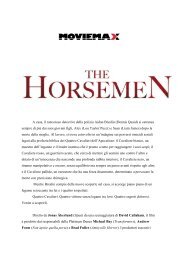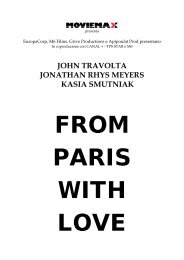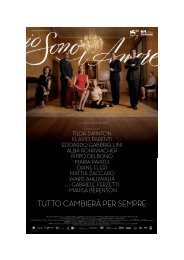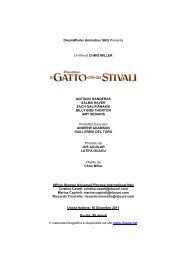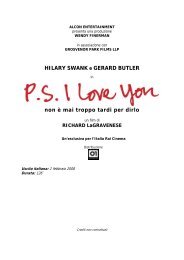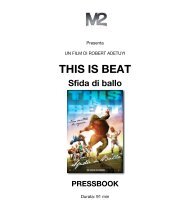PRESSBOOK BAARIA - Studio Vezzoli
PRESSBOOK BAARIA - Studio Vezzoli
PRESSBOOK BAARIA - Studio Vezzoli
You also want an ePaper? Increase the reach of your titles
YUMPU automatically turns print PDFs into web optimized ePapers that Google loves.
MEDUSA FILM<br />
presenta | presents<br />
un film scritto e diretto da | a film written and directed by<br />
GIUSEPPE TORNATORE<br />
una produzione | produced by<br />
MEDUSA FILM<br />
realizzata da | executive producer<br />
MARIO COTONE per | for EXON FILM<br />
distribuzione | distribution<br />
MEDUSA FILM
CAST TECNICO | TECHNICAL CAST<br />
regia | direction GIUSEPPE TORNATORE<br />
soggetto e sceneggiatura | story and screenplay GIUSEPPE TORNATORE<br />
direttore della fotografia | director of photography ENRICO LUCIDI<br />
musiche composte, orchestrate e dirette da<br />
score composed orchestrated & conducted by ENNIO MORRICONE<br />
montatore | film editor MASSIMO QUAGLIA<br />
scenografo | art director MAURIZIO SABATINI<br />
costumista | costume design ANTONELLA BALSAMO<br />
LUIGI BONANNO<br />
fonico | sound<br />
supervisore effetti visivi digitali<br />
FAOUZI THABET<br />
digital visual effects supervisor MARIO ZANOT<br />
effetti visivi digitali | digital visual effects STORYTELLER<br />
organizzatore | organizer GIORGIO INNOCENTI<br />
produttore esecutivo | executive producer MARIO COTONE<br />
produzione | production company MEDUSA FILM<br />
vendite internazionali | worldwide sales<br />
SUMMIT ENTERTAINMENT LLC<br />
1630 Stewart Street, Suite 120<br />
Santa Monica, CA 90404<br />
phone: 310-309-8400<br />
fax: 310-828-4132<br />
ufficio stampa | press office<br />
STUDIO LUCHERINI PIGNATELLI<br />
Via A. Secchi, 8 – 00197 Roma<br />
tel / fax: 06/8084282<br />
e mail: info@lucherinipignatelli.it<br />
www.lucherinipignatelli.it
Peppino FRANCESCO SCIANNA<br />
Mannina MARGARETH MADÈ<br />
Sarina (giovane) | (young girl) NICOLE GRIMAUDO<br />
Sarina (adulta) | (adult) ANGELA MOLINA<br />
Tana e mendicante | Tana and Beggar LINA SASTRI<br />
Nino SALVO FICARRA<br />
Luigi VALENTINO PICONE<br />
Cicco (adulto) | (adult) GAETANO ARONICA<br />
Cicco (giovane) | (young boy) ALFIO SORBELLO<br />
Figlio mendicante | Beggar Son LUIGI LO CASCIO<br />
Minicu ENRICO LO VERSO<br />
Giacomo Bartolotta NINO FRASSICA<br />
Studentessa | Student LAURA CHIATTI<br />
Esponente Pci | Pci Representative MICHELE PLACIDO<br />
Capocomico | Theatre Company Leader VINCENZO SALEMME<br />
Corteccia GIORGIO FALETTI<br />
Renato Guttuso CORRADO FORTUNA<br />
Maestro catechismo | Catechism Teacher PAOLO BRIGUGLIA<br />
Liborio LEO GULLOTTA<br />
Venditore dollari | Seller of Dollars BEPPE FIORELLO<br />
Farmacista | Pharmacist LUIGI MARIA BURRUANO<br />
Fotografo | Photographer FRANCO SCALDATI<br />
Affarista | Profiteer ALDO BAGLIO<br />
Ragazza del muratore<br />
Bricklayer’s Girlfriend MONICA BELLUCCI<br />
Merciaia | Haberdashery Woman DONATELLA FINOCCHIARO<br />
Podestà MARCELLO MAZZARELLA<br />
Giornalista romano | Roman Reporter RAOUL BOVA<br />
Maestro commissione esami<br />
Master Board of Examiners GABRIELE LAVIA<br />
Padrone magazzino limoni<br />
Lemons' Warehouse owner SEBASTIANO LO MONACO<br />
CAST ARTISTICO | ARTISTIC CAST<br />
Allevatore | Breeder TONY SPERANDEO<br />
La sposa | The Bride ELENA RUSSO<br />
Moglie carabiniere | Carabiniere’s Wife GISELLA MARENGO<br />
Alberto Sordi ALESSANDRO DI CARLO<br />
Peppino (bambino) | (child) GIOVANNI GAMBINO<br />
Peppino (adolescente) | (adolescent) DAVIDE VIVIANI<br />
Mannina (bambina) | (child) MARIANGELA DI CRISTINA<br />
Nino (bambino) | (child) CHRISTIAN CANZONERI<br />
Pietro (bambino) | (child) GIUSEPPE GARUFI<br />
Pietro (adolescente) | (adolescent) GAETANO SCIORTINO<br />
Michele (bambino) | (child) GIUSEPPE RUSSO<br />
Michele (adolescente) | (adolescent) MAURIZIO SAN FRATELLO<br />
Angela (bambina) | (child) VALENTINA E DESIRÉE RUBINO<br />
Angela (adolescente) | (adolescent) ANNA FARANNA<br />
Onofrio FABRIZIO ROMANO<br />
Gino Artale GAETANO BRUNO<br />
Don Giacinto LOLLO FRANCO<br />
Pietro (ragazzo) | (boy) MARCO IERMANO’<br />
Rosalia ADELE TIRANTE<br />
Turiddu il sellaio | the Saddler MICHELE RUSSO<br />
Rosa LAURETANA DI SALVO<br />
Carru Minà e nipote | and nephew GAETANO BALISTRERI<br />
Ignazio Buttitta ALESSANDRO SCHIAVO<br />
Gaspare ORIO SCADUTO<br />
Alberto Lattuada ENRICO SALIMBENI<br />
Banditore | Auctioneer SALVATORE FRANCESCO GUZZO<br />
Padre sarina | Sarina’s Father LUDOVICO VITRANO<br />
Giovane fabbro | Young Smith SALVATORE FILIPPONE<br />
Dirigente studenti | Student Leader LEANDRO BELLANCA<br />
Sindaco | Mayor NINO RUSSO<br />
Fidanzato Mannina | Mannina’s Fiancé DANIELE PERRONE
Segretario Cgil | Cgil Secretary ROBERTO SALEMI<br />
Compagno Federazione | Federation Comrade SANTO DI STEFANO<br />
Dirigente regionale Pci | Pci Regional Leader FRANCESCO FOTI<br />
Padre Nespola | Father Nespola ORAZIO STRACUZZI<br />
Strano tipo | Strange Man TOMMASO CAPORRIMO<br />
Tipografo | Printer ALESSIO PIAZZA<br />
Carabiniere ALESSANDRO AGNELLO<br />
Prima maestra | First Teacher SERENA BARONE<br />
Seconda maestra | Second Teacher MARIA GAGLIANO<br />
Piccolo proprietario | Small Land Owner PARIDE BENASSAI<br />
Lettore | Reader MIMMO CUTICCHIO<br />
Maestra catechismo | Catechism Teacher FILIPPA GRECO<br />
Rita ZAIRA RUMEO<br />
Primo compagno Pci | First Pci Comrade GIUSEPPE CENTAMORE<br />
Secondo compagno Pci | Second Pci Comrade DOMENICO BUTERA<br />
Terzo compagno Pci | Third Pci Comrade UGO GIACOMAZZI<br />
Fotografo giovane | Young Photographher ALESSIO BAFFA SCINELLI<br />
Filippo GIOVANNI CORVAIA<br />
Assessore urbanistica<br />
City Planning Councillor RAFFAELE SABATO<br />
Barbiere | Barber EMANUELE GULLOTTO<br />
Bidello | Janitor VINCENZO BONANNO<br />
1° Bracciante | First Labourer MARCELLO VILLA<br />
2° Bracciante | Second Labourer GIUSEPPE CICI<br />
Provocatore | Troublemaker TURI D’ANCA<br />
Capo milizia | Militia Leader RAFFAELE GANGALE<br />
Cieca | Blind Woman MARIA LUCIA MARFIA<br />
Attanasio ROBERTO ADELFIO<br />
Cassiere cinema | Cinema Cashier MIMMO PINTACUDA<br />
Cocchiere | Coachman GINO PROVENZANO<br />
Sciancato | Cripple GIUSEPPE DI SALVO<br />
Donna Bastiana KATIA GARGANO<br />
Prima vicina | First Neighbour DORIANA LA FAUCI<br />
Seconda vicina | Second Neighbour YVONNE MINEO<br />
Terza vicina | Third Neighbour SIMONA MALATO<br />
Ex sfollato | Former Evacuee FRANCO GALLETTO<br />
Fabbro | Smith MEHRZ KOKLI<br />
Fifetto VINCENZO GARUFI<br />
Forzuto | Strongly Built Man CARMELO CANNAVO’<br />
Giocatore briscola | Card Player ROSARIO GAGLIANO<br />
Guardia municipale | Town Policeman LUCIANO FEDERICO<br />
Istruttrice ballo | Dance Teacher ROSSANA GIACALONE<br />
Levatrice | Midwife MARIA BOSCO<br />
Macellaio | Butcher BERNARDO SALVATORE SERAGUSA<br />
Medico | Doctor GIUSEPPE RUVOLO<br />
Balbuziente | Stutterer GIOVANNI CANGIALOSI<br />
Presidente seggio | Po ling Station Chairman MICHELE D’AMATO<br />
Principe | Prince ANTONINO GIORDANO<br />
Professore | Professor PINO AIELLO<br />
Ragazza uliveto | Girl in the Olive Grove MANUELA SPARTÀ<br />
Scagnozzo Don Giacinto<br />
Don Giacinto’s Henchman GIOVANNI MARTORANA<br />
Sacrestana<br />
Woman in Charge of the Sacristy MARIA TERESA DE SANCTIS<br />
Soldato americano | American Soldier DUSTIN LEE<br />
Primo spettatore cinema<br />
First Spectator Cinema GIUSEPPE SULFARO<br />
Secondo spettatore cinema<br />
Second Spectator Cinema SALVATORE PROVINO<br />
Terzo spettatore cinema<br />
Third Spectator Cinema ANTONIO LO PIPARO<br />
Brigadiere carabinieri<br />
“Brigadiere” of the Carabinieri AHMED EL HAFIENE<br />
Primo ragazzo banda | First Boy in the Band LUCA CAMPAGNA<br />
Secondo ragazzo banda<br />
Second Boy in the Band DAVIDE GALLINA<br />
Terzo ragazzo banda | Third Boy in the Band GABRIELE GIUSEPPE TERRANOVA<br />
Uomo Dc | Man from the Dc Party SERGIO VESPERTINO<br />
Compagno sezione | Party Branch Comrade ENRICO ROCCAFORTE<br />
Segretaria Lattuada | Lattuada’s Secretary NADIA LA MALFA
UNA PICCOLA PREMESSA A SHORT INTRODUCTION<br />
In base ad una delle innumerevoli etimologie possibili, Bagheria<br />
deriverebbe anche da Bab el gherid, che in arabo dovrebbe voler dire Porta<br />
del vento. Ma, da che mondo è mondo, noi l’abbiamo sempre chiamata<br />
Baarìa.<br />
Si, Baarìa, provincia di Palermo, il paese dove sono nato e cresciuto sino<br />
all’età di ventotto anni. Troppi per don Fabrizio Salina, il Principe de Il<br />
Gattopardo, che sosteneva si dovesse abbandonare la Sicilia prima del<br />
diciassettesimo compleanno, per impedire al carattere degli uomini<br />
d’assimilare i difetti dei siciliani.<br />
Io, dunque, ho fatto a tempo ad assorbirli tutti. Primo, certamente, il<br />
credere che il luogo in cui si è nati sia l’ombelico del mondo, anzi il mondo<br />
stesso. Ultimo, ma non meno grave, l’effimero rifugiarsi nel limbo dei<br />
ricordi una volta appurato che il mondo, in realtà, era sempre stato da<br />
un’altra parte e girava senza di noi.<br />
Ecco, è forse per rincorrere l’ingenuità perduta il giorno in cui sono sceso<br />
dalla nave della Sicilia, o peggio, per essere coerente con le mie tare di<br />
baariòto, che da più di vent’anni (sebbene qualche traccia sia già emersa<br />
nelle mie opere d’ambiente siciliano) rimugino di farci un film su quella<br />
stagione ineffabile e senza tempo della mia vita in cui l’Universo nasceva a<br />
via Gioacchino Guttuso 114, si snodava da piazza Madrice lungo lo<br />
stratonello di corso Umberto I, e finiva alla rotonda di Palagonia. Poche<br />
centinaia di metri, tutto sommato. Ma percorrendole avanti e indietro per<br />
anni, potevi imparare ciò che il mondo non ti avrebbe mai insegnato.<br />
Giuseppe Tornatore<br />
One of the countless possible etymologies has it that Bagheria might also<br />
derive from Bab el gherid, which in Arabic apparently means The Gateway<br />
of the wind. But, from time immemorial, we’ve always called it Baarìa.<br />
Baarìa, in the Palermo province, the town where I was born and raised up<br />
to the age of 28. Too old according don Fabrizio Salina, the Prince in The<br />
Leopard, who claimed that young men should leave Sicily before they<br />
turned seventeen to avoid absorbing into their character the typical Sicilian<br />
flaws.<br />
So I had the time to absorb them all. First of all, definitely, the idea that<br />
wherever you were born is the centre of the world, indeed, is the world<br />
itself. And lastly, but no less serious, the ephemeral escape into the limbo<br />
of your memories as soon as you realise that the world has actually<br />
always been elsewhere and has kept on turning without you.<br />
Well, it is perhaps to recapture the innocence I lost the day I disembarked<br />
from my ship from Sicily or, even worse, to be consistent with the flaws I<br />
have by being a baariòto that, for over twenty years (some traces had<br />
already surfaced in my works set against a Sicilian background), I have<br />
been thinking about making a film about the unique and timeless season<br />
in my life when the Universe started in via Gioacchino Guttuso 114,<br />
unfolded from piazza Madrice along the alley of Corso Umberto I, and<br />
ended at the roundabout di Palagonia. It’s only, all in all, a few hundred<br />
metres. But if you walk them up and down for years, you could learn what<br />
the whole world will never be able to teach you.<br />
Giuseppe Tornatore
SINOSSI SINOPSYS<br />
Una storia, divertente e malinconica, di grandi passioni e travolgenti<br />
utopie. Una leggenda affollata di eroi…<br />
Una famiglia siciliana raccontata attraverso tre generazioni: da Cicco al<br />
figlio Peppino al nipote Pietro…<br />
Sfiorando le vicende private di questi personaggi e dei loro familiari, il<br />
film evoca gli amori, i sogni, le delusioni di un’intera comunità vissuta tra<br />
gli anni trenta e gli anni ottanta del secolo scorso nella provincia di<br />
Palermo: negli anni del Fascismo Cicco è un modesto pecoraio che trova,<br />
però, il tempo di dedicarsi al proprio mito: i libri, i poemi cavallereschi, i<br />
grandi romanzi popolari. Nelle stagioni della fame e della Seconda<br />
Guerra Mondiale, suo figlio Peppino s’imbatte nell’ingiustizia e scopre la<br />
passione per la politica. Nel Dopoguerra, il fatale incontro con la donna<br />
della sua vita. Una relazione osteggiata da tutti perché Peppino è<br />
diventato comunista. Ma i due ragazzi riusciranno a realizzare il loro<br />
sogno d’amore.<br />
An amusing and wistful story of great passions and passionate utopian<br />
dreams. A legend thronged with heroes …<br />
A Sicilian family depicted across three generations: from Cicco to his son<br />
Peppino to his grandson Pietro…<br />
Touching lightly upon the private lives of these characters and their<br />
families, the film evokes the loves, dreams and disappointments of an<br />
entire community in the Palermo province between the ‘30s and the ‘80s<br />
of the past century: during the Fascist period, Cicco is a humble<br />
shepherd who, however, finds time to pursue his passion: books, epic<br />
poems, the great popular romance novels. In the days when people went<br />
hungry and during World War II, his son Peppino witnesses injustice and<br />
discovers a passion for politics. After the war, his fateful encounter with<br />
the woman of his life. A relationship opposed by one and all because<br />
Peppino has become a Communist. But the two young lovers will<br />
succeed in fulfilling their dream.
I NUMERI DI BAARÌA THE NUMBERS IN BAARÌA<br />
9 mesi di preparazione<br />
12 mesi di costruzioni scenografiche<br />
25 settimane di riprese<br />
1/10/2007 inizio riprese<br />
7/8/2008 fine riprese<br />
4 periodi di interruzione delle riprese (problemi meteo, esigenze organizzative)<br />
122 locations<br />
2.800 costumi<br />
174 scene<br />
210 personaggi<br />
63 attori professionisti<br />
147 attori non professionisti<br />
35.000 comparse<br />
200 componenti di troupe<br />
350 tecnici per le costruzioni scenografiche<br />
1.200 metri cubi di legname<br />
250 veicoli di scena, carrozze, carretti, auto d’epoca, etc…<br />
1.500 animali di scena<br />
2.603 inquadrature girate<br />
3.222 tagli di montaggio<br />
1.107 interventi digitali<br />
2 edizioni (dialetto siciliano e italiano)<br />
1.431 musicisti in 25 turni di registrazione<br />
27 temi musicali originali<br />
30 brani di repertorio musicale<br />
Dalla fine degli anni ’10 ad oggi, l’arco storico compreso nel film<br />
9 months of preparation<br />
12 months to build the sets<br />
25 weeks of filming<br />
1/10/2007 start of principal photography<br />
7/8/2008 end of principal photography<br />
4 interruptions in filming (weather problems, organizational requirements)<br />
122 locations<br />
2.800 costumes<br />
174 scenes<br />
210 characters<br />
63 professional actors<br />
147 non-professional actors<br />
35.000 extras<br />
200 crew members<br />
350 set construction technicians<br />
1.200 cubic metres of timber<br />
250 vehicles, carriages, carts, classic cars, etc…<br />
1.500 animals<br />
2.603 film shots<br />
3.222 editing cuts<br />
1.107 digital effects<br />
2 editions (Sicilian dialect and Italian)<br />
1.431 musicians in 25 recording sessions<br />
27 original music themes<br />
30 music repertoire pieces<br />
From the late 1910s to the present day, the historical period covered by the film
INTERVISTE INTERVIEWS<br />
ENNIO MORRICONE | Colonna sonora<br />
Il mio lavoro parte dalla attentissima lettura della sceneggiatura. Del film voglio<br />
sapere tutto. Personaggi, snodi narrativi, ambientazione, periodo storico. Sin dal<br />
primo approccio a Baarìa, mi sono reso conto che sarebbe stata un’opera complessa<br />
e molto delicata. Una cavalcata storica attraverso i primi decenni del Novecento, ma<br />
anche il film in cui Tornatore avrebbe reso omaggio alla sua terra natale e per<br />
riflesso alla sua famiglia.<br />
Di fronte alla responsabilità di scrivere la musica per un film così importante, ho<br />
cercato di trovare la chiave giusta. E prima ancora di vedere il primo montaggio<br />
dell’opera, ho scritto alcuni dei suoi temi musicali più significativi. Tornatore è stato<br />
contento e anche stavolta ci siamo trovati subito d’accordo nella direzione da dare al<br />
lavoro.<br />
Non è per fare un complimento a Peppuccio, ma ammetto d’essere rimasto stregato<br />
dal film. Non è un semplice tassello della sua straordinaria filmografia, ma un’opera<br />
che ferma il tempo, un punto d’arrivo pieno di tutti quegli elementi che ne fanno<br />
un’opera maggiore.<br />
Sono sicuro che il pubblico non potrà non apprezzare l’altissima ispirazione emanata<br />
da ogni immagine e il suo carattere di potente epopea solcata da un umanismo totale<br />
e accorato.<br />
MAURIZIO SABATINI | Scenografie<br />
Tutto ha inizio intorno alla fine del 2006. Giuseppe Tornatore mi invita a pranzo e mi<br />
mette al corrente del suo progetto. Un film, ma non solo. Una vera impresa titanica<br />
che avrebbe richiesto un lavoro duro e lunghissimo. Non mi sono tirato indietro.<br />
Lavorare con un regista come lui non capita esattamente tutti i giorni. Il lavoro di<br />
documentazione è cominciato subito dopo e ha assunto immediatamente i tratti di<br />
una ricerca meticolosa e certosina. Sarebbe stato fondamentale non lasciare nulla al<br />
caso e gettare delle basi solide per la costruzione di una macchina scenica<br />
complessa come poche altre.<br />
Dopo due mesi di ricerche ho presentato i risultati a Tornatore che ha subito<br />
approvato. La nostra collaborazione è nata sotto questo segno. Insomma, passione,<br />
determinazione ed entusiasmo.<br />
Dopo tre mesi di progettazione scenografica, le riprese hanno avuto inizio. La Tunisia<br />
è stata una scelta azzeccatissima. In primis perché ci si lavora davvero bene e poi<br />
perchè i suoi luoghi più belli presentano tantissime analogie con la Bagheria dei<br />
primi anni del secolo scorso.<br />
Il primo set è stato allestito alle porte di Tunisi, all’interno di una fabbrica dismessa;<br />
ENNIO MORRICONE | Soundtrack<br />
My work is always based on a detailed study of the script. I need to know<br />
everything about a film. The characters, the twists and turns in the plot, the<br />
setting, the historical timeframe. Right from my initial approach to Baarìa, I<br />
realized it was going to be a very complex and delicate undertaking. A journey<br />
across the early decades of the 20th century, but also a film through which<br />
Tornatore meant to pay tribute to his homeland and consequently to his family.<br />
Faced with the responsibility of writing the score for such an important film, I<br />
needed to find the right key. Even before seeing the rough cut of the film, I had<br />
already written some of the more significant musical themes. Tornatore was<br />
pleased and once again we found that, right from the start, we were in full<br />
agreement as to the direction the work should take.<br />
I’m not just paying Peppuccio a compliment; this film has enchanted me. It isn’t<br />
only yet another movie in his extraordinary filmography, but rather a work that<br />
can make time stand still, it is a point of arrival with all that it takes for it to be a<br />
great work of art.<br />
Audiences will not – I’m sure - fail to appreciate the very high inspiration<br />
emanating from every single scene and the powerful epic nature of this film which<br />
is permeated with an all-encompassing and deeply-felt humanism.<br />
MAURIZIO SABATINI | Art Director<br />
Everything started towards the end of 2006. Giuseppe Tornatore invited me to lunch<br />
and told me about his project. A film, but more than just that. A truly titanic<br />
undertaking which was going to require a great deal of hard work. I accepted the<br />
challenge. It’s not often you get an opportunity to work with a director of such<br />
standing. The research work began immediately and right from the start it was<br />
detailed and painstaking work. It was essential not to leave anything to chance and to<br />
lay the ground firmly for the development of a stage setting machinery that was<br />
going to be much more complicated than many others are.<br />
After two months of research, I submitted my results to Tornatore who approved<br />
them immediately. Our work together was born under this sign. Altogether, passion,<br />
determination and enthusiasm.<br />
After three months of set design planning, filming began. Tunisia was the best<br />
possible choice. First of all because you can work extremely well there but also<br />
because the most beautiful places there present a number of analogies with<br />
Bagheria as it was in the early 20th century.<br />
The first set was built just outside Tunis, in an abandoned factory, the second one,
il secondo invece lo abbiamo creato ad Hammamet.<br />
La difficoltà più grande è stata senza dubbio quella di far sì che l’impianto<br />
scenografico si prestasse a ‘saltare’ da un periodo storico all’altro. Ci sono stati giorni<br />
in cui l’azione si svolgeva negli anni Venti del Novecento, altri in cui invece si spostava<br />
negli anni Sessanta. Insomma, una scenografia a spasso nel tempo, resa magica<br />
grazie all’impegno di tutti e alla straordinaria e alacre vis di Tornatore. Il suo è un<br />
film che rimarrà negli annali del cinema, non solo italiano.<br />
Mi verrebbe da paragonarlo per certi aspetti a “C’era una volta in America”…<br />
FRANCESCO SCIANNA | Peppino<br />
Protagonista del nuovo film di Tornatore… Roba da non crederci. Dopo aver ricevuto<br />
la notizia, ho iniziato a giocare a calcetto. Beata incoscienza. Durante i giorni di<br />
ripresa, andavo a letto tardissimo e mi alzavo alle cinque del mattino. L’unico modo<br />
questo per smorzare l’ansia e non caricarmi di pressione eccessiva. Per il resto è<br />
stata un’esperienza esaltante e ho trovato in Margareth Madè una straordinaria<br />
compagna di set.<br />
MARGARETH MADÈ | Mannina<br />
Com’è arrivata fino a qui una modella come me? Semplice, dopo tre provini andati<br />
male. Al quarto, quello affrontato per una parte in Baarìa, sono stata scelta come<br />
protagonista. Dire che è stata l’esperienza più pazzesca della mia vita è poco. A<br />
testimoniarlo sono le lacrime cadute l’ultimo giorno di riprese. Tornatore è unico. La<br />
cosa che più lo ha affascinato della mia persona è stata il volto, un volto antico che<br />
secondo lui sarebbe andato benissimo per il film.<br />
NICOLE GRIMAUDO | Sarina giovane<br />
Sono stata contattata per il ruolo parecchie settimane dopo il provino. E la sera<br />
stessa mi sono letteralmente ubriacata, tanta era l’emozione provata di fronte a<br />
quello che mi aspettava. Probabilmente Tornatore mi ha scelta per la mia grinta da<br />
siciliana verace e lo ringrazio con tutto il cuore per questo. Essere diretta da un<br />
regista come lui è stata un’esperienza a dir poco formativa. E poi non posso che<br />
essere fiera di aver contribuito a un film che è un autentico manifesto della<br />
sicilianità.<br />
ANGELA MOLINA | Sarina adulta<br />
Tornatore mi ha telefonato il giorno del mio compleanno. Gran bella notizia quella di<br />
poter prendere parte a un film così ambizioso e importante. Ero talmente contenta<br />
che ho persino deciso di smettere col fumo. Quando ci siamo incontrati, gli ho subito<br />
chiesto di farmi sapere qualcosa di più sul ruolo che avrei interpretato. Piccola<br />
instead, at Hammamet.<br />
Unquestionably the most difficult aspect involved designing a set in which it would be<br />
possible to “leap” from one historic period to another. On some days the action took<br />
place in the ‘20s of the 1900s, on other days we were in the ‘60s. So, these sets<br />
needed to travel through time and they were given a magical character thanks to<br />
everyone’s work and to Tornatore’s “alacre vis”. This is a film which will go down<br />
in,the history of filmmaking, and not just Italian filmmaking.<br />
In some ways, I feel it is comparable to “Once upon a time in America”…<br />
FRANCESCO SCIANNA | Peppino<br />
The lead role in Tornatore’s new film… hard to believe! When I was told, I went off<br />
to play soccer. Rather reckless of me. While we were filming, I used to go to bed<br />
very late and get up at 5.00 am. It was the only way for me to ease my anxiety and<br />
avoid feeling over-pressured. Apart from that, it has been a thrilling experience and<br />
Margareth Madè was an extraordinary partner on the set.<br />
MARGARETH MADÈ | Mannina<br />
How did a model like me get this far? Easy, after three unsuccessful screen tests.<br />
When I did my fourth one, the one for Baarìa, I landed the lead role. To say that it was<br />
the most incredible experience in my life would be a gross understatement. As<br />
confirmed by the fact that I wept on the last day of shooting. Tornatore is unique.<br />
What he found fascinating about me was my face, a face from the past which he felt<br />
would be perfect for his film.<br />
NICOLE GRIMAUDO | The Young Sarina<br />
I was contacted for this role several weeks after my screen test. And I actually got<br />
drunk that evening, I was so excited. Tornatore probably chose me because of my<br />
strong full-blooded Sicilian character and I am deeply grateful to him.<br />
To work with a director like him has been, to say the least, a formative experience.<br />
And I can only feel proud about having contributed to a film which is an authentic<br />
manifesto of the Sicilian character.<br />
ANGELA MOLINA | Adult Sarina<br />
Tornatore called me on my birthday. What a great piece of news, to be part of such an<br />
ambitious and important film. I was so happy that I even decided to stop smoking.<br />
When we met, I asked him to tell me more about my role. I must confess I was rather<br />
worried I might have to play, once again, a hateful character like I did in The<br />
Unknown Woman. But this wasn’t the case. My character fully reflects the<br />
extraordinary and magical nature of the film. Because Baarìa is first and foremost a
confessione: avevo paura di dover tornare a vestire i panni di un personaggio odioso,<br />
com’era già accaduto ne La sconosciuta. E invece non è stato così. Il mio personaggio<br />
rispecchia in tutto e per tutto la straordinaria e magica natura del film. Perché Baarìa<br />
è prima di tutto un racconto sulla memoria dell’infanzia, una profonda riflessione sul<br />
tempo e sulle radici della nostra storia. Una vera impresa che solo uno come<br />
Giuseppe avrebbe potuto condurre in porto.<br />
LINA SASTRI | Tana<br />
Baarìa per me è il film del destino. Erano anni che avrei dovuto lavorare con<br />
Tornatore. C’eravamo fatti una promessa diverso tempo fa, ma poi per diversi motivi<br />
non eravamo mai riusciti a incrociare le nostre strade. La fatalità ha voluto che<br />
questa fosse la volta buona. Il giorno dopo essere stata chiamata ho preso un volo<br />
per Catania, direzione Bagheria. Dire che fossi emozionata è poco. L’unica vera<br />
difficoltà incontrata sul set è stata quella relativa alla questione del dialetto. Da<br />
napoletana verace, mi sono dovuta cimentare nel dialetto siciliano e non è stata<br />
proprio una passeggiata.<br />
SALVO FICARRA E VALENTINO PICONE | Nino e Luigi<br />
Dopo aver ricevuto la notizia di essere stati scelti da Tornatore, abbiamo spento il<br />
cellulare. La paura di un suo ripensamento ci ha tormentato, infatti, nelle ore<br />
successive…<br />
LUIGI LO CASCIO | Mendicante<br />
Nel momento in cui mi fu comunicato che avrei fatto parte del cast del film, mi<br />
trovavo di fronte alla chiesa in cui mi sono sposato. Mi è sembrato un vero e proprio<br />
segno del destino. L’avventura sul set è iniziata dunque all’insegna di un entusiasmo<br />
sfrenato che mi ha portato a fare una preziosa esperienza di cinema e di vita. Mi<br />
piace molto Tornatore e quel suo inconfondibile modo di rapportarsi agli attori. E’ un<br />
uomo di cinema che riesce a far dare il meglio ad ogni attore, spingendolo magari ad<br />
avventurarsi in territori sconosciuti. Mi ha subito spiegato la reale natura del<br />
personaggio che avrei interpretato e per farlo lo ha paragonato al coreuta di un coro<br />
tragico. Colui che insomma è parte integrante della scena, pur distillando la sua<br />
presenza in campo. La più grande dote che ho scoperto in Giuseppe è la sua capacità<br />
di avere un doppio sguardo: panoramico e microscopico insieme. E’ un regista che<br />
possiede un senso panoramico della messa in scena e un’attenzione non comune al<br />
dettaglio.<br />
ENRICO LO VERSO | Minicu<br />
Tornatore ha subito messo le cose in chiaro, comunicandomi che il mio sarebbe stato<br />
tale about childhood memories, a deep reflection on time and the roots of our history.<br />
A major undertaking in which only someone like Giuseppe could have succeeded.<br />
LINA SASTRI | Tana<br />
To me Baarìa is a fateful film. I had been thinking about working with Tornatore for<br />
years. We had promised each other a long time ago but then, for a number of<br />
reasons, our paths never crossed. As luck would have it, this time it all worked out.<br />
The day after I received his call, I took a flight to Catania, destination Bagheria. I was,<br />
to put it mildly, excited. The only real problem I had on the set was the dialect. I’m a<br />
full-blooded Neapolitan and having to speak the Sicilian dialect was no easy task.<br />
SALVO FICARRA E VALENTINO PICONE | Nino and Luigi<br />
When we heard Tornatore had chosen us, we switched off our mobile phones. For the<br />
rest of the day, in fact, we were terrified he might change his mind ...<br />
LUIGI LO CASCIO | A Beggar<br />
When I was told I was going to be part of the cast of the film, I was just outside the<br />
church where I got married. It seemed a really good omen. My adventure on the set<br />
began with unrestrained enthusiasm and it has given me a chance to gain a very<br />
valuable experience in filmmaking and in life itself. I like Tornatore and the unique<br />
kind of relationship he establishes with actors. As a filmmaker, he succeeds in<br />
bringing out the best in each and every actor, pushing him or her even to venture into<br />
unknown territory. He immediately explained to me the real nature of the character I<br />
was to play, comparing him to a chorister in a tragic chorus. Someone who is an<br />
integral part of the scene even though he must distil his presence there. The greatest<br />
quality I have discovered in Giuseppe is his ability to consider things on two different<br />
planes: a general and a microscopic level simultaneously. He is a director with an allencompassing<br />
sense of staging and an uncommon focus on detail.<br />
ENRICO LO VERSO | Minicu<br />
Tornatore made things very clear from the start, telling me that mine was to be a<br />
cameo role. But I had no trouble accepting, one rarely gets an opportunity to work<br />
with someone like him. First of all I had to go on a diet. In the times described by the<br />
film, people went hungry and their physical condition was, to say the least, poor. This<br />
is why, over a short period of time, I lost as much as 11 kilos. And that was just the<br />
start. To really get into the role of the shepherd, for a while I lived in a sheepfold on<br />
the Madonie mountains. Conditions were, to put it mildly, difficult: it was dark, water<br />
was rationed and I had no bed. But it was a necessary and important experience. In<br />
line with what Tornatore requires of his actors: simply their utmost. I am much more
un piccolo ruolo. Ma non ho avuto problemi ad accettare anche perché lavorare con<br />
uno come lui è un’esperienza che non capita tutti i giorni. La prima cosa che ho<br />
dovuto fare è stata mettermi a dieta. Nel periodo in cui si svolge il film, la gente<br />
pativa la fame e lo stato fisico non era proprio eccezionale. Ragion per cui ho perso<br />
nel giro di poco ben undici chili. E non è stato che l’inizio. Per entrare con convinzione<br />
nel ruolo del pastore, ho vissuto per qualche tempo in una stalla, sui monti delle<br />
Madonie. Le condizioni erano a dir poco precarie: buio, acqua razionata e senza letto.<br />
Ma è stata un’esperienza necessaria e importante. In linea insomma con quello che<br />
Tornatore chiede i suoi attori: semplicemente il massimo. Mi trovo molto più a mio<br />
agio con un regista così piuttosto che con quelli che si accontentano subito.<br />
NINO FRASSICA | Giacomo Bartolotta<br />
Quando tanti anni fa vidi Il camorrista, rimasti colpito dal talento di quel regista di cui<br />
non si sapeva ancora nulla. Dopo tanti anni, Tornatore è ormai diventato uno dei più<br />
grandi registi della scena cinematografica attuale. L’essere stato scelto da uno come<br />
lui è stato come vincere un premio, un premio molto importante.<br />
MICHELE PLACIDO | Esponente Pci<br />
L’esperienza fatta con Tornatore sul set de La sconosciuta è stata davvero<br />
importante. Non ha segnato infatti soltanto la nascita di una bella amicizia, ma anche<br />
l’instaurarsi di una collaborazione che – ne sono certo - darà ancora molti frutti in<br />
futuro. Quello che ho con Giuseppe non è infatti soltanto il rapporto attore/regista,<br />
ma qualcosa di più profondo, un’intesa che ha a che fare con una sorta di scrittura<br />
creativa in progress. Mi piace girare con lui anche perché sa coinvolgermi sempre,<br />
chiedendomi spesso consigli e pareri. E sono davvero orgoglioso di aver preso parte<br />
a questo film che rappresenterà senza dubbio una delle vette artistiche di Giuseppe.<br />
VINCENZO SALEMME | Capocomico<br />
Durante una sera come tante altre mi stavo noleggiando un film. Improvvisamente<br />
squilla il cellulare, era Giuseppe Tornatore, colui che ritengo il più grande regista<br />
italiano di oggi. L’aver partecipato a Baarìa mi ha riempito d’orgoglio.<br />
BEPPE FIORELLO | Venditore di dollari<br />
Non lo avevo mai incontrato prima Tornatore, ma è uno di quei registi che ho sempre<br />
amato. L’esperienza diretta sul set mi ha dato poi la possibilità di conoscerlo bene e<br />
devo confessare d’essere rimasto piuttosto stupito. Vedendo i suoi film mi ero fatto<br />
una certa idea di lui, ero sicuro di trovarmi di fronte a un tipo austero e serioso,<br />
invece tutto il contrario. L’aspetto che mi ha colpito maggiormente di Giuseppe è la<br />
sua profonda ironia. E’ un uomo molto divertente, uno spirito acuto che sa trascinarti<br />
comfortable with a director like him than I am with those who are easily pleased.<br />
NINO FRASSICA | Giacomo Bartolotta<br />
When I saw The Professor many years ago, I was impressed by the talent of this<br />
director who was as yet unknown. After all these years, Tornatore has become one of<br />
the greatest directors in filmmaking today. Being chosen by someone like him has<br />
been like winning an award, a very important award.<br />
MICHELE PLACIDO | Pci Representative<br />
My experience with Tornatore on the set of The Unknown Woman was very<br />
important. Indeed, it didn’t mark only the birth of a wonderful friendship, but also the<br />
beginning of our collaboration which – I’m sure – will be productive also in the future.<br />
My relationship with Giuseppe isn’t just an actor/director relationship; it goes deeper,<br />
an understanding which has to do with a sort of creative writing in progress. I enjoy<br />
working with him also because he always succeeds in making me feel involved, often<br />
asking my advice and opinion. And I am very proud to have played a role in this film<br />
which is bound to stand out as one of Giuseppe’s most important artistic<br />
achievements.<br />
VINCENZO SALEMME | Theatre Company Leader<br />
One evening like many others I had gone out to rent a film. Suddenly, my mobile<br />
phone rang, it was Giuseppe Tornatore, the man I consider the greatest Italian film<br />
director today. Getting a role in Baarìa has filled me with pride.<br />
BEPPE FIORELLO | Seller of Dollars<br />
I had never met Tornatore, but he has always been one of my favourite film directors.<br />
This direct experience on the set has given me a chance to get to know him well and I<br />
must admit I was quite surprised. After seeing his films, I had an impression of him<br />
which led me to believe I would be dealing with a rather stern and serious man.<br />
Instead, I found the complete opposite. The thing that has impressed me most about<br />
Giuseppe is his rich irony. He is a very amusing man, with a sharp mind, someone<br />
who sweeps you away like a river in flood. And indeed Baarìa is a great comedy, with<br />
some really humorous scenes.<br />
ALDO BAGLIO | Profiteer<br />
When Giuseppe called me, he was still working on the script. I’m happy that my role<br />
in Baarìa is going to be a nice surprise for everyone. By this I don’t mean to say that it<br />
will mark a new beginning. This time, I’m playing a “bad guy”, it’s true, but I think
come un fiume in piena. Non è un caso che Baarìa sia una grandissima commedia,<br />
piena di momenti davvero divertenti.<br />
ALDO BAGLIO | Affarista<br />
Quando Giuseppe mi ha chiamato in studio, stava ancora lavorando alla<br />
sceneggiatura del film. Sono felice perchè il mio ruolo in Baarìa rappresenterà senza<br />
dubbio una bella sorpresa per tutti. Con questo non voglio dire che si tratterà<br />
dell’inizio di un nuovo corso. In questa occasione interpreto un ‘cattivo’, è vero, ma<br />
almeno per diverso tempo rimarrà un caso isolato nella mia filmografia. E al tempo<br />
stesso un’esperienza davvero unica. Tornatore è un vero treno, la determinazione<br />
fatta persona. Oltre a essere uno dei pochi oggi in Italia a saper pensare in grande.<br />
RAOUL BOVA | Giornalista romano<br />
Io e Tornatore siamo tipi molto introversi, ragion per cui tutte le volte in cui ci siamo<br />
incontrati negli anni scorsi non c’è mai stata l’occasione per approfondire la nostra<br />
conoscenza. E’ invece accaduto sul set di Baarìa dove ho scoperto un uomo gentile e<br />
scrupoloso, appassionato ed esigente. L’ultimo straordinario rappresentante di un<br />
cinema che oggi non esiste più.<br />
LOLLO FRANCO | Don Giacinto<br />
In occasione della mia partecipazione al film, ho rivisto Tornatore dopo vent’anni. E’<br />
stata una vera emozione anche perché tanti anni orsono fui proprio io a consegnare a<br />
Giuseppe il suo primo premio importante che portava la dicitura di ‘poeta<br />
dell’immagine’. Ecco, se dovessi definirlo in una parola sola, userei questa, poeta<br />
dell’immagine. Non è un semplice artista, ma un vero genio che va ad aggiungersi a<br />
tutti quei grandi uomini nati a Bagheria capaci di esprimere con la propria arte una<br />
visione del mondo e l’attaccamento alle proprie radici siciliane. Tornatore è uno dei<br />
pochi registi italiani a saper catturare l’anima di un popolo.<br />
MICHELE RUSSO | Turiddu il sellaio<br />
Baarìa è il film della mia ripartenza artistica. Dopo qualche anno in cui per diverse<br />
ragioni ho lavorato a singhiozzo, essere chiamato da Tornatore mi ha veramente<br />
commosso. Quale film migliore di questo dunque per dare una nuova svolta al<br />
proprio percorso? Le esperienze fatte sul set sono state fantastiche e mi ha colpito<br />
molto l’amore pazzesco che Tornatore nutre nei confronti di ogni attore. Gli si legge<br />
chiaramente negli occhi che vorrebbe avere sempre un po’ più di tempo per stare sul<br />
set e spiegare perfettamente a ognuno quale dovrà essere il contributo da apportare<br />
al film.<br />
that, at least for a while, this will be just an isolated case in my filmography. And it<br />
has also been a truly unique experience. Tornatore is a real steamroller, he embodies<br />
determination. In addition to being one the few people in Italy today who are able to<br />
think big.<br />
RAOUL BOVA | Roman Journalist<br />
Tornatore and I are both introverts which is why every time we met in the past, there<br />
had never been an opportunity to get to know each other better. This did instead<br />
happen on the set of Baarìa where I discovered a man who is kind and thorough,<br />
impassioned and demanding. The last outstanding representative of a kind of cinema<br />
that today no longer exists.<br />
LOLLO FRANCO | Don Giacinto<br />
Taking part in the film has meant meeting Tornatore again after twenty years. I found<br />
it very moving because, a long time ago, I was the one to present Giuseppe with his<br />
first important award which was inscribed with the words “the poet of images”. So,<br />
were I to describe him in one word, this is the one I would use, a poet of images. He<br />
is not just an artist, he’s a real genius, one more in the long list of great men born in<br />
Bagheria who have succeeded in expressing a vision of the world and of their bond<br />
with their Sicilian roots through their art. Tornatore is one of the few Italian film<br />
directors who know how to capture the soul of a people.<br />
MICHELE RUSSO | Turiddu the Saddler<br />
Baarìa is a film which marks a new artistic beginning for me. Over the last few years,<br />
for a number of reasons, I’ve worked only occasionally and I was really touched when<br />
Tornatore called me. Which film could possibly have been better in changing the<br />
direction of my work? My experience on the set was fantastic and I was deeply<br />
impressed by the incredible love Tornatore feels for all the actors. You can see it in<br />
his eyes that he always wishes he had more time to spend on the set and to explain<br />
in detail to each and every actor the contribution he wants them to make to the film.
I REALIZZATORI THE FILMMAKERS<br />
GIUSEPPE TORNATORE | Regista e Sceneggiatore<br />
È nato a Bagheria (Palermo). Dopo lunghi anni dedicati al teatro, alla fotografia<br />
ed alla realizzazione di numerosi documentari, esordisce appena ventinovenne<br />
nella regia cinematografica con il film “Il Camorrista” del quale firma la<br />
sceneggiatura insieme a Massimo De Rita. Ma è nel 1989 che s’impone<br />
all’attenzione del cinema internazionale con “Nuovo Cinema Paradiso”, il film di<br />
cui è soggettista e sceneggiatore che gli varrà l’Oscar come migliore film<br />
straniero. Da allora i film di Tornatore sono stati regolarmente distribuiti in tutto<br />
il mondo riscuotendo premi e successo. Tra gli attori più noti che hanno preso<br />
parte nei suoi film, ricordiamo: Ben Gazzarra, Jacques Perrin, Marcello<br />
Mastroianni, Michèle Morgan, Sergio Castellitto, Laura Del Sol, Philippe Noiret,<br />
Tim Roth, Gerard Depardieau, Roman Polanski, Monica Bellucci, Michele Placido.<br />
FILMOGRAFIA ESSENZIALE<br />
1986 IL CAMORRISTA, liberamente ispirato al libro di Giuseppe Marrazzo e<br />
interpretato da Ben Gazzara, Laura Del Sol, Leo Gullotta.<br />
1988 NUOVO CINEMA PARADISO, interpretato da Philippe Noiret, Jacques<br />
Perrin e Salvatore Cascio.<br />
1990 STANNO TUTTI BENE con Marcello Mastroianni e Michèle Morgan.<br />
1991 IL CANE BLU episodio del film “La domenica specialmente” dai racconti di<br />
Tonino Guerra.<br />
1994 UNA PURA FORMALITA’ interpretato da Gerard Depardieu, Roman<br />
Polanski e Sergio Rubini.<br />
1995 L’UOMO DELLE STELLE con Sergio Castellitto, Tiziana Lodato, Leopoldo<br />
Trieste.<br />
LO SCHERMO A TRE PUNTE Antologia cinematografica.<br />
1998 LA LEGGENDA DEL PIANISTA SULL’OCEANO con Tim Roth, Pruitt Taylor<br />
Vince, Melanie Thierry, Peter Vaughn.<br />
2000 MALÈNA con Monica Bellucci e Giuseppe Sulfaro.<br />
2006 LA SCONOSCIUTA con Xenia Rappoport, Michele Placido<br />
GIUSEPPE TORNATORE | Director and Screenwriter<br />
Born in Bagheria (Palermo). After many years dedicated to the theatre, to<br />
photography and to the making of a number of documentary films, he made his<br />
debut at 29 as a film director with “The Professor”, for which he also co-wrote<br />
the screenplay with Massimo De Rita. But it was in 1989 that he achieved<br />
international renown with “Cinema Paradiso”, for which he wrote the story and<br />
the screenplay and which won him an Academy Award for Best Foreign Film.<br />
Since then, Tornatore’s films have been regularly distributed worldwide winning<br />
him awards and success. The most important actors in his films include: Ben<br />
Gazzarra, Jacques Perrin, Marcello Mastroianni, Michèle Morgan, Sergio<br />
Castellitto, Laura Del Sol, Philippe Noiret, Tim Roth, Gerard Depardieau, Roman<br />
Polanski, Monica Bellucci, Michele Placido.<br />
ESSENTIAL FILMOGRAPHY<br />
1986 IL CAMORRISTA / THE PROFESSOR, based on the book by Giuseppe<br />
Marrazzo and starring Ben Gazzara, Laura Del Sol, Leo Gullotta.<br />
1988 NUOVO CINEMA PARADISO, starring Philippe Noiret, Jacques Perrin and<br />
Salvatore Cascio.<br />
1989 STANNO TUTTI BENE / EVERYBODY’S FINE starring Marcello Mastroianni<br />
and Michèle Morgan.<br />
1991 IL CANE BLU an episode in the film "La domenica specialmente" based on<br />
stories by Tonino Guerra.<br />
1994 UNA PURA FORMALITA’ / A PURE FORMALITY starring Gerard Depardieu,<br />
Roman Polanski and Sergio Rubini.<br />
1995 L’UOMO DELLE STELLE / THE STAR MAKER starring Sergio Castellitto,<br />
Tiziana Lodato, Leopoldo Trieste.<br />
LO SCHERMO A TRE PUNTE Film anthology.<br />
1998 LA LEGGENDA DEL PIANISTA SULL’OCEANO / THE LEGEND OF 1900<br />
starring Tim Roth, Pruitt Taylor Vince, Melanie Thierry, Peter Vaughn.<br />
2000 MALÈNA starring Monica Bellucci and Giuseppe Sulfaro.<br />
2006 LA SCONOSCIUTA / THE UNKNOWN WOMAN starring Xenia Rappoport,<br />
Michele Placido
ENNIO MORRICONE | Compositore<br />
Di origine romana, è diventato famoso in tutto il mondo per la sua collaborazione con il<br />
regista Sergio Leone, componendo le musiche della trilogia cinematografica di Clint<br />
Eastwood: “Per un pugno di dollari” (1964), “Per qualche dollaro in più” (1965) e “Il<br />
buono, il brutto e il cattivo” (1966). Nato nel 1928, Ennio Morricone ha studiato<br />
composizione musicale con Goffredo Petrassi al Conservatorio di Santa Cecilia. Ha<br />
lavorato come arrangiatore dalla fine degli anni 50 alla metà degli anni 60, con artisti<br />
come Mario Lanza, Paul Anka, Charles Aznavour e Gianni Morandi. Il suo primo incarico<br />
cinematografico è arrivato nel 1961 (con “Il federale” di Luciano Salce).<br />
Ha lavorato sin dagli inizi della sua carriera cinematografica con alcuni dei più grandi<br />
registi europei tra i quali Pier Paolo Pasolini, Mauro Bolognini, Elio Petri, Gillo<br />
Pontecorvo, Henry Verneuil, Giuliano Montaldo. Tra i registi americani e inglesi, per i quali<br />
ha lavorato, ricordiamo: Don Siegel, John Boorman, Terence Malik, Richard Fleisher e<br />
William Friedklin. Il riconoscimento americano è arrivato con la colonna sonora per il<br />
film di Roland Joffe “Mission” (1986), che gli è valso una delle quattro candidature<br />
all’Oscar ottenute nel corso della sua carriera. Dopo “Mission”, ha composto numerose<br />
colonne sonore di successo tra le quali quella per “Frantic” di Roman Polanski (1988);<br />
“Vittime di guerra” di Brian De Palma (1989); “Amleto” di Franco Zeffirelli (1990);<br />
“Legami” di Pedro Almodovar (1990); “La città della gioia” di Roland Joffe (1992); “Al<br />
centro del mirino” di Wolfgang Petersen (1993) e “Wolf – La belva è fuori” di Mike Nichols<br />
(1994). Una delle colonne sonore preferite dal pubblico di tutto il mondo è quella scritta<br />
da Ennio Morricone per “Nuovo cinema Paradiso” (1988) – (Oscar miglior film straniero)<br />
di Giuseppe Tornatore, che sceglie il compositore per tutti i suoi film successivi.<br />
Negli ultimi anni ha curato le colonne sonore per i film:<br />
2001 IL GIOCO DI RIPLEY di Liliana Cavani;<br />
AIDA DEGLI ALBERI (Animazione) di Guido Manuli<br />
2002 PERLASCA, UN EROE ITALIANO (TV) di Alberto Negrin<br />
SENSO 45 di Tinto Brass<br />
Giovanni XXIII (TV) di Ricky Tognazzi<br />
2003 I GUARDIANI DELLE NUVOLE di Luciano Odorisio<br />
AL CUORE SI COMANDA di Giovanni Morricone<br />
2004 E SORRIDENDO LA UCCISE di Florestano Vancini<br />
SORSTALANSAG di Lajos Voltai<br />
2005 IL CUORE NEL POZZO (TV) di Alberto Negrin<br />
CEFALONIA (TV) di Riccardo Milani<br />
UN UOMO DIVENTATO PAPA (TV) di Giacomo Battiato<br />
LUCIA (TV) di Pasquale Pozzessere<br />
2006 GINO BARTALI (TV) di Alberto Negrini<br />
LA PROVINCIALE (TV) di Pasquale Pozzessere<br />
GIOVANNI FALCONE (TV) di Antonio e Andrea Frazzi<br />
ENNIO MORRICONE | Composer<br />
A Roman, he acquired international renown thanks to his work with film director<br />
Sergio Leone, composing the scores for the film trilogy starring Clint Eastwood: “A<br />
fistful of dollars” (1964), “For a few dollars more” (1965) and “The good, the bad and<br />
the ugly” (1966). Born in 1928, Ennio Morricone studied musical composition with<br />
Goffredo Petrassi at the Conservatory of Santa Cecilia. He worked as an arranger from<br />
the late ‘50s to the mid-60’s, with artists like Mario Lanza, Paul Anka, Charles<br />
Aznavour and Gianni Morandi. His first assignment for a film score came in 1961 (with<br />
“Il federale” directed by Luciano Salce). From the start of his career in films he<br />
worked with some of the leading European film directors such as Pier Paolo Pasolini,<br />
Mauro Bolognini, Elio Petri, Gillo Pontecorvo, Henry Verneuil, Giuliano Montaldo.<br />
The American and British film directors with whom he has worked include: Don<br />
Siegel, John Boorman, Terence Malik, Richard Fleisher and William Friedklin.<br />
American recognition came with the score for Roland Joffe’s film “Mission” (1986),<br />
which won him one of the four Academy Award nominations he has received in the<br />
course of his career. After “Mission”, he composed a number of successful film scores<br />
such as the ones for “Frantic” by Roman Polanski (1988); “Casualties of War” by Brian<br />
De Palma (1989); “Hamlet” by Franco Zeffirelli (1990); “Tie me up! Tie me down”” by<br />
Pedro Almodovar (1990); “The city of joy” by Roland Joffe (1992); “In the line of fire” by<br />
Wolfgang Petersen (1993) and “Wolf” by Mike Nichols (1994). One of the most<br />
successful soundtracks, loved by audiences worldwide, is the one Ennio Morricone<br />
wrote for “Cinema Paradiso” (1988) – (Academy Award for Best Foreign Film) by<br />
Giuseppe Tornatore, who chose him for the scores of all his other films.<br />
Over the past few years he has written the following film scores:<br />
2001 IL GIOCO DI RIPLEY by Liliana Cavani;<br />
AIDA DEGLI ALBERI (Animation) by Guido Manuli<br />
2002 PERLASCA, UN EROE ITALIANO (TV) by Alberto Negrin<br />
SENSO 45 by Tinto Brass<br />
JOHN XXIII (TV) by Ricky Tognazzi<br />
2003 I GUARDIANI DELLE NUVOLE by Luciano Odorisio<br />
AL CUORE SI COMANDA by Giovanni Morricone<br />
2004 E SORRIDENDO LA UCCISE by Florestano Vancini<br />
SORSTALANSAG by Lajos Voltai<br />
2005 IL CUORE NEL POZZO (TV) by Alberto Negrin<br />
CEFALONIA (TV) di Riccardo Milani<br />
A MAN WHO BECAME POPE (TV) by Giacomo Battiato<br />
LUCIA (TV) by Pasquale Pozzessere<br />
2006 GINO BARTALI (TV) by Alberto Negrini<br />
LA PROVINCIALE (TV) by Pasquale Pozzessere<br />
GIOVANNI FALCONE (TV) by Antonio and Andrea Frazzi
UN PAPA RIMASTO UOMO (TV) di Giacomo Battiato<br />
2007 I DEMONI DI SAN PIETROBURGO di Giuliano Mondtaldo<br />
L’ULTIMO DEI CORLEONESI (TV) di Alberto Negrin<br />
TUTTE LE DONNE DELLA MIA VITA di Simona Izzo<br />
2008 PANE E LIBERTA’ - Giuseppe Di Vittorio (TV) di Alberto Negrin<br />
RISOLUZIONE 819 di Giacomo Battiato<br />
MARIO COTONE | Produttore<br />
1984 C’ERA UNA VOLTA IN AMERICA di Sergio Leone<br />
1987 L’ULTIMO IMPERATORE di Bernardo Bertolucci<br />
1988 IL FRULLO DEL PASSERO di Gianfranco Mingozzi<br />
HAUNTED SUMMER di Ivan Passer<br />
1989 ACQUE DI PRIMAVERA di Jerzy Skolimowski<br />
1990 CORTESIE PER GLI OSPITI di Paul Schrader<br />
STANNO TUTTI BENE di Giuseppe Tornatore<br />
NON APRITE ALL’UOMO NERO di Giulio Questi<br />
1991 MARCELLINO di Luigi Comencini<br />
1993 PICCOLO BUDDHA di Bernardo Bertolucci<br />
1995 L’UOMO DELLE STELLE di Giuseppe Tornatore<br />
1996 IO BALLO DA SOLA di Bernardo Bertolucci<br />
IL BARBIERE DI ZIO di Giovanni Veronesi<br />
1997 LA VITA È BELLA di Roberto Benigni<br />
1998 VIOLA BACIA TUTTI di Giovanni Veronesi<br />
SOMETHING TO BELIEVE IN di John Hough<br />
COSÌ RIDEVANO di Gianni Amelio<br />
IL MIO WEST di Giovanni Veronesi<br />
2000 CANONE INVERSO di Ricky Tognazzi<br />
MALÈNA di Giuseppe Tornatore<br />
2002 HEAVEN di Tom Tykwer<br />
CUORI ESTRANEI di Edoardo Ponti<br />
L’ULTIMO DEL PARADISO (TV) di Stefano Vicario<br />
PINOCCHIO di Roberto Benigni<br />
2004 EVILENKO di David Grieco<br />
2005 L’EDUCAZIONE FISICA DELLE FANCIULLE di John Irvin<br />
2006 LA STELLA CHE NON C’È di Gianni Amelio<br />
ENRICO LUCIDI | Direttore della fotografia<br />
2000 IL MANOSCRITTO DEL PRINCIPE di Roberto Andò<br />
2005 IL CUORE NEL POZZO (TV) Alberto Negrin<br />
THE POPE REMAINED A MAN (TV) by Giacomo Battiato<br />
2007 DEMONS OF SAINT PETERSBURG by Giuliano Montaldo<br />
L'ULTIMO DEI CORLEONESI (TV) by Alberto Negrin<br />
ALL THE WOMEN OF MY LIFE by Simona Izzo<br />
2008 PANE E LIBERTA’ - Giuseppe Di Vittorio – (TV) by Alberto Negrin<br />
RESOLUTION 819 by Giacomo Battiato<br />
MARIO COTONE | Producer<br />
1984 ONCE UPON A TIME IN AMERICA by Sergio Leone<br />
1987 THE LAST EMPEROR by Bernardo Bertolucci<br />
1988 THE SPARROW'S FLUTTERING by Gianfranco Mingozzi<br />
HAUNTED SUMMER by Ivan Passer<br />
1989 TORRENTS OF SPRING by Jerzy Skolimowski<br />
1990 THE COMFORT OF STRANGERS by Paul Schrader<br />
EVERYBODY’S FINE by Giuseppe Tornatore<br />
DON'T OPEN THE DOOR FOR THE MAN IN BLACK by Giulio Questi<br />
1991 MARCELLINO by Luigi Comencini<br />
1993 LITTLE BUDDHA by Bernardo Bertolucci<br />
1995 THE STAR MAKER by Giuseppe Tornatore<br />
1996 STEALING BEAUTY by Bernardo Bertolucci<br />
THE BARBER OF RIO by Giovanni Veronesi<br />
1997 LIFE IS BEAUTIFUL by Roberto Benigni<br />
1998 VIOLA KISSES EVERYBODY by Giovanni Veronesi<br />
SOMETHING TO BELIEVE IN by John Hough<br />
THE WAY WE LAUGHED by Gianni Amelio<br />
MY WEST by Giovanni Veronesi<br />
2000 MAKING LOVE by Ricky Tognazzi<br />
MALÈNA by Giuseppe Tornatore<br />
2002 HEAVEN by Tom Tykwer<br />
BETWEEN STRANGERS by Edoardo Ponti<br />
L’ULTIMO DEL PARADISO (TV) by Stefano Vicario<br />
PINOCCHIO by Roberto Benigni<br />
2004 EVILENKO by David Grieco<br />
2005 THE FINE ART OF LOVE: MINE HA-HA by John Irvin<br />
2006 THE MISSING STAR by Gianni Amelio<br />
ENRICO LUCIDI | Director of Photography<br />
2000 THE PRINCE’S MANUSCRIPT by Roberto Andò<br />
2005 IL CUORE NEL POZZO (TV) by Alberto Negrin
2006 GINO BARTALI - L’INTRAMONTABILE (TV) di Alberto Negrin<br />
GIORNI DA LEONE 2” TV SERIES di Francesco Barilli<br />
SARTORIA TIRELLI - VESTIRE IL CINEMA (2006) di Gianfranco Giagni<br />
2007 L’ULTIMO DEI CORLEONESI (TV) di Alberto Negrin<br />
IL GENERALE DALLA CHIESA TV MINI-SERIES di Giorgio Capitani<br />
2009 IAGO regia di Volfango De Biasi<br />
MASSIMO QUAGLIA | Montatore<br />
1994 UNA PURA FORMALITÀ di Giuseppe Tornatore<br />
L’UOMO DELLE STELLE di Giuseppe Tornatore<br />
LO SCHERMO A TRE PUNTE di Giuseppe Tornatore<br />
LA LEGGENDA DEL PIANISTA SULL’OCEANO di Giuseppe Tornatore<br />
2000 MALÈNA di Giuseppe Tornatore<br />
IL RITORNO DEGLI DEI di Sergio Giordani<br />
IL MANOSCRITTO DEL PRINCIPE di Roberto Andò<br />
2001 VAJONT di Renzo Martinelli<br />
2002 DUE AMICI di Spiro Scimone e Francesco Sframelli<br />
2003 PIAZZA DELLE CINQUE LUNE di Renzo Martinelli<br />
2004 LE CINQUE GIORNATE DI MILANO di Carlo Lizzani<br />
TOSCA E LE ALTRE DUE di Giorgio Ferrara<br />
2005 ALCIDE DE GASPERI (TV)di Liliana Cavani<br />
LA BAMBINA DALLE MANI SPORCHE di Renzo Martinelli<br />
2006 LA SCONOSCIUTA di Giuseppe Tornatore<br />
ASSUNTA SPINA (TV) di Riccardo Milani<br />
ORGOGLIO 3 (TV) di Giorgio Serafini<br />
CINA ALLO SPECCHIO di Sergio Giordani<br />
2007 TUTTE LE DONNE DELLA MIA VITA di Simona Izzo<br />
CANTO DI LIBERTÀ di Valerio D’ Annunzio<br />
HOTEL MEINA di Carlo Lizzani<br />
LA STRANIERA di Marco Turco<br />
EINSTEIN di Liliana Cavani<br />
ARTEMISIA SANCHEZ (TV) di Ambrogio Lo Giudice<br />
2008 RINO GAETANO (TV) di Marco Turco<br />
REBECCA LA PRIMA MOGLIE (TV) di Riccardo Milani<br />
MAURIZIO SABATINI | Scenografo<br />
PRODUCTION DESIGNER<br />
2002 TOSCA E ALTRE DUE di Giorgio Ferrara<br />
2003 LA VITA DEI SANTI di Jerry Ciccorritti<br />
2006 GINO BARTALI - L'INTRAMONTABILE (TV) by Alberto Negrin<br />
GIORNI DA LEONE 2" TV SERIES by Francesco Barilli<br />
SARTORIA TIRELLI - VESTIRE IL CINEMA (2006) by Gianfranco Giagni<br />
2007 L'ULTIMO DEI CORLEONESI (2007) (TV) by Alberto Negrin<br />
IL GENERALE DALLA CHIESA (2007) TV MINI-SERIES by Giorgio Capitani<br />
2009 IAGO directed by Volfango De Biasi<br />
MASSIMO QUAGLIA | Montatore<br />
1994 A PURE FORMALITY by Giuseppe Tornatore<br />
THE STAR MAKER by Giuseppe Tornatore<br />
LO SCHERMO A TRE PUNTE by Giuseppe Tornatore<br />
THE LEGEND OF 1900 by Giuseppe Tornatore<br />
2000 MALÈNA by Giuseppe Tornatore<br />
IL RITORNO DEGLI DEI by Sergio Giordani<br />
THE PRINCE’S MANUSCRIPT by Roberto Andò<br />
2001 VAJONT by Renzo Martinelli<br />
2002 TWO FRIENDS by Spiro Scimone and Francesco Sframelli<br />
2003 FIVE MOONS PLAZA by Renzo Martinelli<br />
2004 LE CINQUE GIORNATE DI MILANO by Carlo Lizzani<br />
TOSCA E LE ALTRE DUE by Giorgio Ferrara<br />
2005 ALCIDE DE GASPERI (TV) by Liliana Cavani<br />
LA BAMBINA DALLE MANI SPORCHE by Renzo Martinelli<br />
2006 THE UNKNOWN by Giuseppe Tornatore<br />
ASSUNTA SPINA (TV) by Riccardo Milani<br />
ORGOGLIO 3 (TV) by Giorgio Serafini<br />
CINA ALLO SPECCHIO by Sergio Giordani<br />
2007 ALL THE WOMEN OF MY LIFE by Simona Izzo<br />
CANTO DI LIBERTÀ by Valerio D’ Annunzio<br />
HOTEL MEINA by Carlo Lizzani<br />
LA STRANIERA by Marco Turco<br />
EINSTEIN by Liliana Cavani<br />
ARTEMISIA SANCHEZ (TV) by Ambrogio Lo Giudice<br />
2008 RINO GAETANO (TV) by Marco Turco<br />
REBECCA THE FIRST WIFE (TV) by Riccardo Milani<br />
MAURIZIO SABATINI | Set Designer<br />
PRODUCTION DESIGNER<br />
2002 TOSCA E ALTRE DUE by Giorgio Ferrara<br />
2003 LIVES OF SAINTS by Jerry Ciccorritti
2004 LA FESTA DEL BAROCCO Istituto italiano di cultura a Parigi<br />
LA TIGRE E LA NEVE di Roberto Benigni<br />
2005 CONVENTION BULGARI - Venezia<br />
2006 IL PROSSIMO TUO di AnneRiitta Ciccone<br />
ART DIRECTOR<br />
1997 LA VITA È BELLA di Roberto Benigni (Production Designer: Danilo Donati)<br />
1999 NANA’ di Alberto Negrin (Production Designer: Danilo Donati)<br />
2000 JERUSALEM di Ermanno Olmi (Production Designer: Danilo Donati)<br />
2001 PINOCCHIO di Roberto Benigni (Production Designer: Danilo Donati)<br />
ANTONELLA BALSAMO | Costumista<br />
Ha lavorato molto nel teatro.<br />
TELEVISIONE<br />
2002 UNA FAMIGLIA PER CASO di Camilla Costanzo, Alessio Cremonini<br />
2004 LE CINQUE GIORNATE DI MILANO di Carlo Lizzani<br />
2005 RACCONTAMI di Riccardo Donna, Tiziana Aristarco<br />
CINEMA<br />
1999 TOBIA AL CAFFE’ di Gianfranco Mingozzi<br />
2000 VAJONT di Renzo Martinelli<br />
2001 IL CONSIGLIO D’EGITTO di Emidio Greco<br />
2002 PIAZZA DELLE CINQUE LUNE di Renzo Martinelli<br />
2003 AMORE E LIBERTA’ – MASANIELLO di Angelo Antonucci<br />
2004 PADIGLIONE 22 di Livio Bordone<br />
2006 L’UOMO DI VETRO di Stefano Incerti<br />
QUELL’ESTATE FELICE di Beppe Cino<br />
LA TERZA MADRE di Dario Argento<br />
2009 L’OMBRA di Federico Zampaglione<br />
LUIGI BONANNO | Costumista<br />
1988 NUOVO CINEMA PARADISO di Giuseppe Tornatore<br />
1990 STANNO TUTTI BENE di Giuseppe Tornatore<br />
1994 UNA PURA FORMALITÀ di Giuseppe Tornatore<br />
1995 L’UOMO DELLE STELLE di Giuseppe Tornatore<br />
2001 VAJONT di Renzo Martinelli<br />
2002 MARIA JOSÉ L’ULTIMA REGINA (TV) di Carlo Lizzani<br />
2003 PIAZZA DELLE CINQUE LUNE di Renzo Martinelli<br />
2004 LE CINQUE GIORNATE DI MILANO di Carlo Lizzani<br />
2004 LA FESTA DEL BAROCCO Italian Cultural Insitute in Paris<br />
THE TIGER AND THE SNOW by Roberto Benigni<br />
2005 THE BULGARI CONVENTION Venice<br />
2006 THY NEIGHBOUR by AnneRiitta Ciccone<br />
ART DIRECTOR<br />
1997 LIFE IS BEAUTIFUL by Roberto Benigni (Production Designer: Danilo Donati)<br />
1999 NANA’ by Alberto Negrin (Production Designer: Danilo Donati)<br />
2000 JERUSALEM by Ermanno Olmi (Production Designer: Danilo Donati)<br />
2001 PINOCCHIO by Roberto Benigni (Production Designer: Danilo Donati)<br />
ANTONELLA BALSAMO | Costume Designer<br />
She has done a great deal of theatre work.<br />
TELEVISION<br />
2002 UNA FAMIGLIA PER CASO by Camilla Costanzo, Alessio Cremonini<br />
2004 LE CINQUE GIORNATE DI MILANO by Carlo Lizzani<br />
2005 RACCONTAMI by Riccardo Donna, Tiziana Aristarco<br />
CINEMA<br />
1999 TOBIA AL CAFFE’ by Gianfranco Mingozzi<br />
2000 VAJONT by Renzo Martinelli<br />
2001 IL CONSIGLIO D’EGITTO by Emidio Greco<br />
2002 FIVE MOONS PLAZA by Renzo Martinelli<br />
2003 AMORE E LIBERTA’ – MASANIELLO by Angelo Antonucci<br />
2004 PADIGLIONE 22 by Livio Bordone<br />
2006 L’UOMO DI VETRO by Stefano Incerti<br />
QUELL’ESTATE FELICE by Beppe Cino<br />
THE THIRD MOTHER by Dario Argento<br />
2009 L’OMBRA by Federico Zampaglione<br />
LUIGI BONANNO | Costume Designer<br />
1988 CINEMA PARADISO by Giuseppe Tornatore<br />
1990 EVERYONE’S FINE by Giuseppe Tornatore<br />
1994 A PURE FORMALITY by Giuseppe Tornatore<br />
1995 THE STAR MAKER by Giuseppe Tornatore<br />
2001 VAJONT by Renzo Martinelli<br />
2002 MARIA JOSÉ L’ULTIMA REGINA (TV) by Carlo Lizzani<br />
2003 FIVE MOONS PLAZA by Renzo Martinelli.<br />
2004 LE CINQUE GIORNATE DI MILANO by Carlo Lizzani
FAOUZI THABET | Fonico<br />
2000 LA SAISON DI S HOMMES di M. Tlatli<br />
2001 QUAND LES HOMMES PLEURENT di Y. Kessari<br />
2002 LA BOITE MAGIQUE di R. Behi<br />
2003 L’ILE MAUDITE di R. Burkel<br />
2006 LA TÉLÉ ARRIVE di M. Dhouib<br />
2007 CAPTAIN ABU RAED di Amin Matalqua<br />
MARIO ZANOT | Supervisore effetti visivi digitali<br />
Inizia la sua carriera come regista pubblicitario. Pioniere del digitale, nel 1985 porta in<br />
Italia il primo sistema di computer animation 3D della Abel Image Research di Los<br />
Angeles. Nel 2000 lascia la pubblicità per dedicarsi al cinema documentario,<br />
realizzando film a carattere scientifico e sociale che ricevono premi e riconoscimenti a<br />
livello internazionale. Nel 2001 fonda STORYTELLER, una casa di produzione<br />
specializzata in effetti digitali per il cinema e la TV. Con Mediaset e Discovery Channel<br />
realizza vari film sui grandi personaggi della storia. Tra questi, IL SOGNO DI<br />
LEONARDO vince il primo premio al Chicago International Film and TV Festival.<br />
Per la Rai crea la serie ALPHA CYBER, una storia di fantascienza ambientata in una<br />
Milano apocalittica, parzialmente ricostruita al computer. Exon Film gli commissiona<br />
gli effetti digitali del trailer del PINOCCHIO di Benigni e successivamente il ruolo di<br />
VFX supervisor nel film LA STELLA CHE NON C’È di Gianni Amelio.<br />
I DUE ATTORI PROTAGONISTI<br />
FRANCESCO SCIANNA | Peppino<br />
TEATRO<br />
1999 IL PROGRESSO E’ UNA FORTUNA DALLA QUALE DIPENDIAMO<br />
(Palermo di scena)<br />
2000 I FISICI regia di F. Durrenmatt<br />
MORTE A PALERMO VIVA (Palermo di scena)<br />
2002 NO AL FASCISMO regia di Mario Ferrero<br />
FRAMMENTI D’AMORE regia di Pino Passalacqua<br />
VIAGGIO NELLA STORIA DI PINOCCHIO regia di Maria Cuscona<br />
2003 LA SIGNORA DALLE CAMELIE di Giancarlo Sepe<br />
2004 UN RE IN ASCOLTO di Luca Ronconi<br />
SCANNA di Sandro Mabellini<br />
2005 TROILO E CRESSIDA di Luca Ronconi<br />
FAOUZI THABET | Sound Engineer<br />
2000 LA SAISON DES HOMMES by M. Tlatli<br />
2001 QUAND LES HOMMES PLEURENT by Y. Kessari<br />
2002 LA BOITE MAGIQUE by R. Behi<br />
2003 L’ILE MAUDITE by R. Burkel<br />
2006 LA TÉLÉ ARRIVE by M. Dhouib<br />
2007 CAPTAIN ABU RAED by Amin Matalqua<br />
MARIO ZANOT | Digital Visual Effects Supervisor<br />
He began his career directing commercials. A pioneer in digital effects technology, he<br />
introduced into Italy in 1985 the first 3D computer animation system from Abel Image<br />
Research of Los Angeles. In 2000 he left advertising to devote his time to documentary<br />
films, making films on scientific and social issues which won him international<br />
recognition and awards. In 2001 he set up STORYTELLER, a production company<br />
specialising in digital effects for cinema and television. He has made a number of films<br />
with Mediaset and Discovery Channel on some of history’s greatest people. Among these<br />
films, LEONARDO’S DREAM was awarded first prize at the Chicago International Film<br />
and TV Festival. For Rai he created the series ALPHA CYBER, a science fiction story set<br />
against the background of an apocalyptic Milan, partially rebuilt digitally. Exon Film<br />
commissioned him for the digital effects for the trailer for Benigni’s PINOCCHIO and he<br />
was subsequently VFX supervisor in the film THE MISSING STAR by Gianni Amelio.<br />
THE TWO LEAD ACTORS<br />
FRANCESCO SCIANNA | Peppino<br />
THEATRE<br />
1999 IL PROGRESSO E’ UNA FORTUNA DALLA QUALE DIPENDIAMO (Palermo di<br />
scena)<br />
2000 I FISICI directed by F. Durrenmatt<br />
MORTE A PALERMO VIVA (Palermo di scena)<br />
2002 NO AL FASCISMO directed by Mario Ferrero<br />
FRAMMENTI D’AMORE directed by Pino Passalacqua<br />
VIAGGIO NELLA STORIA DI PINOCCHIO directed by Maria Cuscona<br />
2003 THE LADY OF THE CAMELIAS by Giancarlo Sepe<br />
2004 UN RE IN ASCOLTO by Luca Ronconi<br />
SCANNA by Sandro Mabellini<br />
2005 TROILO E CRESSIDA by Luca Ronconi
LO SPECCHIO DEL DIAVOLO di Luca Ronconi<br />
2007 IL GABBIANO Sandro Mabellini<br />
A SOLO regia di Lorenzo Salveti<br />
(diploma Accademia Nazionale d’Arte Drammatica “Silvio D’Amico”)<br />
SCENARI DEL NOVECENTO regia di Lorenzo Salveti<br />
TELEVISIONE<br />
2003 R.I.S. DELITTI IMPERFETTI di Alexis Sweet<br />
2004 IL GRANDE TORINO di Claudio Bentivoglio<br />
2005 LA LUNA E IL LAGO di Andrea Porporati<br />
2006 UN CASO DI COSCIENZA 3 di Luigi Perelli<br />
2007 HO SPOSATO UNO SBIRRO di Carmine D’Elia<br />
IL CAPO DEI CAPI di E. Monteleone e A. Sweet<br />
2009 LE COSE CHE RESTANO di Gianluca Tavarelli<br />
CORTOMETRAGGI<br />
2003 PROSSIMA FERMATA di Giorgio Croce Nanni<br />
2005 IL COLPO DI PISTOLA di Giulio Manfredonia<br />
CINEMA<br />
2001 IL PIU’ BEL GIORNO DELLA MIA VITA di Cristina Comencini<br />
2003 L’ODORE DEL SANGUE di Mario Martone<br />
2004 LA TIGRE E LA NEVE di Roberto Benigni<br />
2005 IL REGISTA DI MATRIMONI di Marco Bellocchio<br />
2006 L’UOMO DI VETRO di Stefano Incerti<br />
MARGARETH MADÈ | Mannina<br />
Nasce a Catania nel 1982 e inizia la sua carriera di modella a 15 anni partecipando al<br />
concorso THE Look of the year. Nel 2000 vince il concorso internazionale New model<br />
today Inizia così la sua carriera internazionale di modella con diverse agenzie nel<br />
mondo: South Africa – Spagna – Francia -Germania – Belgio - Gran Bretagna.<br />
In Italia è testimonial per diverse campagne pubblicitarie, tra le quali “Malo” e<br />
“L’Altra moda”. Nel frattempo coltiva il sogno di diventare un’attrice, quando viene<br />
scoperta da un’agente cinematografica, che la segnala al casting dell’ultimo film<br />
scritto e diretto dal premio Oscar Giuseppe Tornatore.<br />
Questo film segna il suo esordio sul grande schermo nel ruolo della protagonista<br />
femminile “Mannina”.<br />
BAARÌA, sarà in concorso e il film di apertura della 66. Mostra Internazionale d’Arte<br />
Cinematografica, in programma al Lido di Venezia dal 2 al 12 settembre 2009.<br />
LO SPECCHIO DEL DIAVOLO by Luca Ronconi<br />
2007 IL GABBIANO by Sandro Mabellini<br />
A SOLO directed by Lorenzo Salveti<br />
(diploma from the “Silvio D’Amico” National Academy of Dramatic Art)<br />
SCENARI DEL NOVECENTO directed by Lorenzo Salveti<br />
TELEVISION<br />
2003 R.I.S. DELITTI IMPERFETTI by Alexis Sweet<br />
2004 IL GRANDE TORINO by Claudio Bentivoglio<br />
2005 LA LUNA E IL LAGO by Andrea Porporati<br />
2006 UN CASO DI COSCIENZA 3 by Luigi Perelli<br />
2007 HO SPOSATO UNO SBIRRO by Carmine D’Elia<br />
IL CAPO DEI CAPI by E. Monteleone and A. Sweet<br />
2009 LE COSE CHE RESTANO by Gianluca Tavarelli<br />
SHORT FILMS<br />
2003 PROSSIMA FERMATA by Giorgio Croce Nanni<br />
2005 IL COLPO DI PISTOLA by Giulio Manfredonia<br />
CINEMA<br />
2001 THE BEST DAY OF MY LIFE by Cristina Comencini<br />
2003 THE SCENT OF BLOOD by Mario Martone<br />
2004 THE TIGER AND THE SNOW by Roberto Benigni<br />
2005 THE WEDDING DIRECTOR by Marco Bellocchio<br />
2006 THE MAN OF GLASS by Stefano Incerti<br />
MARGARETH MADÈ | Mannina<br />
Born in Catania in 1982 she started her career as a model by taking part at the age of 15<br />
in The Look of the year contest. In 2000 she won the New model today international<br />
contest and this launched her international career as a model with several agencies<br />
worldwide: South Africa – Spain – France -Germany – Belgium – Great Britain.<br />
In Italy she starred in several advertising campaigns such as “Malo” and “L’Altra moda”.<br />
Meanwhile, she continued to pursue her dream of becoming an actress and was<br />
discovered by a film agent who suggested her to the casting director for the latest film<br />
written and directed by Academy Award winning director Giuseppe Tornatore.<br />
This film marks her debut in movies in the role of the main female character,<br />
“Mannina”. BAARÌA, will screen in competition and will be the opening film at the 66th<br />
edition of the Venice International Film Festival to be held at Lido di Venezia from 2 to<br />
12 September 2009.
COLONNA SONORA | THE SOUNDTRACK<br />
Musiche composte, strumentate e dirette da<br />
Score composed, orchestrated and conducted by Ennio Morricone<br />
Edizioni Musicali | Music Edition Medusa Film S.p.A.<br />
Produttore Musicale per RTI S.p.A. | Music Producer for RTI S.p.A. Antonello Navarra<br />
Assistente RTI alla produzione musicale | RTI Assistant for Music Production Paola Vanoni<br />
Consulente musicale per Setup Snc | Music Consultant for Setup Snc Piero Cosenza<br />
Orchestra | Orchestra Roma Sinfonietta<br />
Organo della Basilica di S. Maria degli Angeli e dei Martiri - Roma<br />
Giorgio Carmini - Organista | Organist<br />
Solisti | Soloists Gianni Perilli – Ciaramolla | Shawm<br />
Vincenzo Castellana – Tamburo a cornice e marranzano<br />
Frame Drum and Jew’s Harp<br />
Michele Piccioni – Zampogna e Fiscalettu | Bagpipe and Sicilian Flute<br />
Franco Ferranti – Clarinetto | Clarinet<br />
Bruno Battisti D’Amario – Chitarra Classica | Classical Guitar<br />
<strong>Studio</strong> di registrazione e missaggio | Recording <strong>Studio</strong> and Mixing Forum Music Village - Roma<br />
Ingegnere del Suono | Sound Engineer Fabio Venturi<br />
Assistente alle registrazioni | Recording Assistant Davide Palmiotto<br />
Le voci dei carrettieri sono tratte dal cd “Canzuni alla carrittera”, su etichetta Fonti Musicali (FMG 230) eseguite dai “Cantori di Bagheria”<br />
The carters’ voices are from the cd “Canzuni alla carrittera”, under Fonti Musicali (FMG 230) label sung by “Cantori di Bagheria”<br />
I brani “Alla banda dei Carabinieri”, “Baaria” e “Oltre” sono stati eseguiti dalla Banda Musicale dell’Arma dei Carabinieri, diretta da Ennio Morricone<br />
The pieces “Alla banda dei Carabinieri”, “Baaria” and “Oltre” are played by the Band of the Carabinieri Corps conducted by Ennio Morricone<br />
Si ringrazia il Comando Generale dell'Arma dei Carabinieri | Our thanks to the General Command of the Carabinieri Corps
www.medusa.it


